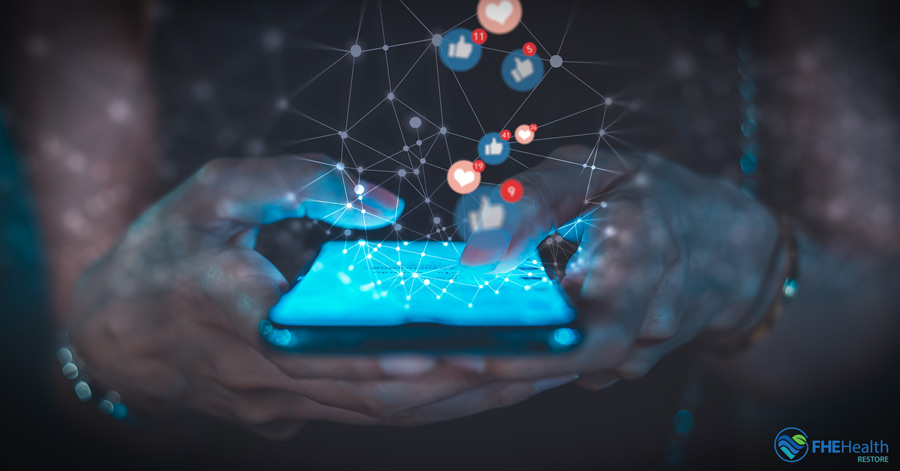Social media algorithms are designed to keep us engaged and coming back for more. They do this by triggering the release of dopamine, a chemical in our brains that makes us feel good. Dopamine is released when we receive likes, comments and other forms of validation on social media. This can lead to addiction as our brains become accustomed to this flood of dopamine and experience withdrawal symptoms when we go without it.
Social media can have a pernicious impact on the way we view the world, other people and even ourselves. It tends to sort us into echo chambers where we’re constantly fed content and information that confirms our preexisting opinions and never challenges our way of thinking. It also gives us a steady diet of the highlights of other people’s lives. This creates a false reference frame we judge ourselves by.
The sections below look at the effects of social media algorithms in psychology and how they impact various parts of our lives.
Algorithms in Psychology: What Is a Social Media Algorithm and How Does It Work?
What is a social media algorithm? It’s a set of parameters used to rank content on platforms such as Instagram, TikTok and Twitter based on how likely each user is to find it interesting and want to engage with it. In theory, these algorithms give each user a personalized experience by feeding them the content they want. In reality, they can serve to confirm existing biases and create a stilted and myopic world view.
For instance, Instagram’s algorithm prioritizes content from accounts a user has previously engaged with. This has some benefits, but it can also prevent users from branching out and exposing themselves to new ideas and new people. TikTok’s algorithm looks at a user’s engagement and uses this data to feed personalized content to a “For You” page that appears when the app is opened. Twitter’s algorithm is ever-evolving in light of the company’s purchase by billionaire tech titan Elon Musk, but it mostly works by boosting or suppressing posts based on how much interaction they receive.
These algorithms ostensibly make platforms more enjoyable and more useful by giving users the content they’d otherwise have to seek out on their own. But they can also lead to problems, both for marketers trying to get their content seen and for users consuming the content. Marketers have the incentive to produce content based on “gaming” the algorithm rather than on being genuine and authentic. And users often get herded into filter bubbles or echo chambers based on their previous interactions and engagement.
Filter Bubbles and Echo Chambers
Social media algorithms can have a negative impact on users by creating filter bubbles and echo chambers that reinforce existing biases and deepen polarization. Filter bubbles happen when social media algorithms show users content based on their previous engagement and likes, effectively shielding them from new or different perspectives. Echo chambers are environments in which like-minded users serve to reinforce each other’s beliefs. Both filter bubbles and echo chambers can lead to a phenomenon called confirmation bias in which people only seek out and consume information that seems to confirm what they already believe.
Filter bubbles and echo chambers are bad for society, as they lead to increased polarization. This can have major real-world consequences. People become more deeply entrenched in their political “teams” and view the other side with increasing wariness and even animosity. In the worst cases, this can lead to outright violence. Echo chambers can also amplify existing prejudices by reinforcing negative stereotypes and implicit biases about groups outside the chamber.
Social media users can counteract these negative effects simply by being aware of them and making a concerted effort to seek out different ideas and perspectives. Media companies themselves can do their part by tweaking algorithms to purposefully expose users to diverse content and viewpoints.
Comparison and Self-Esteem
Social media can be disastrous for self-esteem, especially in adolescents and preadolescents. The constant exposure to idealized online personas, many of which only show the high points of people’s lives and eschew the lowlights, can lead to feelings of inadequacy. When users compare themselves to “influencers” and other glamorized personalities on social media, they can develop negative body images, low self-esteem and FOMO (fear of missing out). This can lead to mental health issues, which psychiatrists have seen a significant uptick in among young people in the social media era.
Even worse, the algorithms can create a vicious cycle by showing users more content related to their struggles, which serves to deepen their feelings of inadequacy. Social media users should keep in mind that these platforms present a distorted view of reality that rarely matches people’s actual day-to-day existence.
Effects on Mental Health
Just how harmful is social media? In excess, it’s extremely detrimental to people’s mental health. It can lead to anxiety, depression and decreased life satisfaction. For users with existing mental health problems, social media can exacerbate them by producing feelings of loneliness and isolation. It can also disrupt sleep patterns, leading to memory loss and cognitive declines.
These problems are compounded, particularly among young users, when bullying and other antisocial behavior takes place online. Unlike with schoolyard bullying, young people don’t get a reprieve when the bell rings at the end of the day. When humiliating information or pictures are posted on social media, a person can’t even escape it by moving to a new town or a new state. This can lead to feelings of hopelessness and despair.
How Is Social Media Harmful, and How Can You Take Control?
Managing social media use can be challenging, but it’s important to prioritize self-care and set boundaries to maintain a healthy relationship with technology. Here are a few practical tips:
- Curate your online environment: Try to follow accounts that inspire and uplift you. Avoid those that bring negativity or stress into your life or hold up unrealistic expectations as a point of comparison.
- Set boundaries: Decide on specific times of the day to check social media and leave it alone otherwise. In particular, avoid scrolling through Instagram or TikTok during meals or right before bed.
- Prioritize self-care offline: Instead of wasting hours mindlessly scrolling social media, make time for activities that bring you joy and help you relax. This could mean exercise, reading or spending time with real people face-to-face.
Has social media impacted your mental health in a negative way? You might benefit from talking to a professional counselor. Restore Mental Health is here to help. Contact us today to get in touch with one of our compassionate team members.






